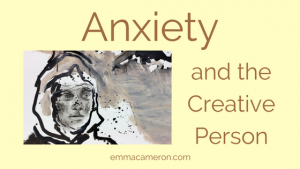Anxiety and the Creative Person
Anxiety, Worry, Panic Attacks, Stress and Overwhelm
Many creative people have questions about anxiety, worry, panic attacks, stress and overwhelm. For example:
- Why do these feelings come up?
- How can I deal with them?
- Can I avoid them and stop them happening again?
- Is there a link between anxiety and being a creative person?
- Does being a highly sensitive person (HSP) make me more prone to anxiety?
- How can I make sure that my creativity isn’t damaged and blocked by my anxiety?
- I often feel a sort of low-level underlying feeling of dread and jitteriness — is this anxiety?
When it comes to anxiety, there’s no ‘one size fits all’ solution. In fact, in a sense, there’s no definitive ‘solution’, because anxiety is a normal part of being human. I experience anxiety from time to time, just as all therapists do; we’re people just like everyone else. Having said that, there are definitely some ways that anxiety can be worked with and understood, that can actually help us grow and change and become fuller, more whole, more psychologically flexible versions of ourselves.
I hope this page will provide some useful ideas and starting points that will serve as a springboard to help you find some interesting, transformative, creative answers within yourself. The number one thing to begin with is to try and develop a stance of friendly curiosity towards your anxiety, instead of judging it as bad and something to be extinguished.
What Causes Anxiety?
In brief, anxiety is generally the name given to what happens when you experience a muddle of emotions that you feel you can’t manage at that moment. You might be completely unaware of the different (often conflicting) emotions you’re having, and instead you just feel incredibly anxious in your body; if your anxiety is very high this may be accompanied by a sense of confusion in your mind.
Anxiety can also be because of uncertainty. Any situation where the outcome is not yet clear, can cause us to feel anxious, and to ruminate and worry. And – this is important – if we respond by trying to avoid something, our anxiety is likely to just build up more.
What Can You Do to Ease Your Anxiety?
What people usually do to try and ease their anxiety is to use a defence or avoidance mechanism, like bingeing on Netflix, drinking too much, starting an argument, or overworking. This can often ease the anxiety in the short term, but it is likely to also be a case of ‘kicking the can further down the road’. The anxiety will tend to return, stronger, sometimes with added features like headache, tension, insomnia, obsessive and/or compulsive behaviours, or an unexpected panic attack.
What can you do instead? One thing you can do is to try and notice any emotions that may be underneath the anxiety. For example, a common situation is that someone feels angry and fearful at the same time. Or sad and angry; or loving and sad and angry all together. This might be (for example) because your loved one is overstepping your boundaries in some way, and yet your natural anger about this clashes with your love for them and your wish to please them.
Identifying underlying emotions can be tricky, and to help with this it may be useful to talk things through with a supportive friend, or to write in your journal. Try and speak about your emotions using the word ‘and’ instead of ‘but’ – for example, “I feel angry with Jon for laughing at me when I was crying, AND I feel sad and alone with my feelings, AND I don’t want to say anything to him because I know he’s been having a hard time recently”.
Naming the emotions, and verbalising how you experience them in your body, can be very helpful in regulating your anxiety. After this, actively processing the emotions can also help. This may be in the form of having a few waves of tears, assertively setting a boundary with someone, or simply feeling into the anger as it moves through your body. [Note: lashing out at someone ragefully, breaking things, or going on a crying jag for hours that leaves you feeling no better, don’t count: these are not ways of processing emotions]. AEDP therapy can be helpful here, as it works so directly with regulating anxiety around emotions.
Anxiety, worry, panic attacks, stress and overwhelm: a creative person's guide Share on XPanic Attacks
Panic attacks can feel terrifying. But they are not dangerous, and there are things you can do to help yourself.
- Handling Panic Attacks: 7 Simple Tools You Can Use
- Ground Yourself – 12 Easy Ways to Get Calmer
- Panic attacks: What Nobody Tells You
Difficult Thoughts
When you are struggling with difficult thoughts that keep on coming back, it can be hard to know how to get out of that loop. Difficult thoughts will sometimes respond well to self-help strategies. But if self-help doesn’t seem to be working over time, it may be wise to seek psychotherapy that can both get to the roots of the problem, and also offer skills and tools for managing your feelings and thoughts day-to-day. Recurrent difficult thoughts can be a symptom of trauma (PTSD).
If you are looking for a therapist, and you suspect (or know) that you have suffered trauma, it’s worth knowing that trauma therapy has changed a lot in recent years. Hopefully you will find a therapist who is reasonably up-to-date with contemporary methods of trauma treatment. If you’re curious about what the differences are, I encourage you to read my article Trauma Therapy Has Changed – Here’s How.
Self-help read: Creative solutions for managing difficult thoughts.
Night-time Anxiety
Waking at night – and then being unable to get back to sleep because of anxiety – is pretty horrible. The sleeplessness can impact your functioning during the day, and it can feel almost unbearable when you’re lying in bed (or pacing the floor downstairs) in the middle of the night. Waking at night with anxiety is often linked to there being something you’ve been avoiding attending to during the day. There might be a practical thing that you need to do, like answering a challenging email, or speaking to someone about the reality of your finances. Use your anxiety as a signal that something needs attending to, and find support to help you address the problem during the day.
Self-help read: How to Stop Lying Awake Worrying: 28 Ideas to Try.
Therapy or Counselling for Anxiety
Self-help can only take you so far with easing your anxiety, worry, panic attacks, stress and overwhelm. If you add in weekly sessions of psychotherapy or counselling, then your self-help strategies are likely to become much more effective.
Why? For simplicity, I won’t go into the neuroscience here too much, so I’ll just say this: very different things happen in the brain and body when we are interacting with another person. And if that person is a properly trained psychotherapist, he or she will have particular ways of listening, connecting with and understanding you, that utilise certain aspects of your brain and nervous system to help you manage your anxiety and stress in new ways.
But if you’ve never had therapy or counselling before (or even if you have), it might feel quite daunting (and, yes, anxiety-inducing!) to contact a therapist and then go and see them. Here are some tips:
Five things to help you feel calm enough to get to your first therapy session:
- Get an idea of what kind of therapy/ therapist you’re looking for. Read my article on Finding a Good Therapist.
- Get a sense of who the therapist is. Maybe there’s a video of them on their website that you can watch? Perhaps you can read an article they’ve written on a therapist directory such as Counselling Directory, Psychology Today, LifeLabs or Welldoing.org. Some therapists have been guests on a podcast that you can listen to, such as Therapy Chat, Therapist Uncensored, Women in Depth, or The Trauma Therapist Podcast.
- Talk to the therapist on the phone first. Many therapists are happy to offer a free 15-minute consultation before booking a first session, and they’ll answer questions or concerns you may have.
- Find out what their treatment would involve.
- Read my article, Your First Counselling Session: 12 Things You Need to Know.
Note: Repetitive intrusive anxious thoughts could be a sign of OCD (obsessive-compulsive disorder). Severe OCD can be particularly helped with CBT (cognitive behavioural therapy) where the therapist gives structured, clear ways for you to alter your avoidance behaviours, along with homework.
Other articles that might be helpful for anxiety, worry, panic attacks, stress and overwhelm
Body Check-in, Your Secret Tool for Self-Awareness
How to Manage Your Climate Anxiety
Ground Yourself — 12 Easy Ways to Get Calmer
Trauma Therapy Has Changed – Here’s How
Help Heal Anxiety and Depression with this Morning Routine
5- Minute Soothing Exercise for HSP’s (Highly Sensitive Persons)
Articles From around the Web
7 Strategies for Using Mindfulness to Reduce Anxiety (by Sharon Martin, LCSW)
I hope this has been useful as a starting-point.

